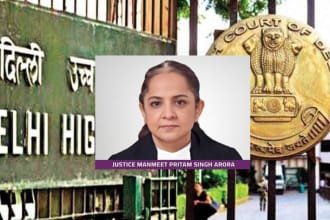In a significant development amidst rising tensions between India and Pakistan, the Punjab and Haryana High Court has taken serious note of interference by Punjab Police personnel in the operations of the Bhakra Nangal Dam. The Court directed the Punjab government to identify and submit details of officers who obstructed the Bhakra Beas Management Board (BBMB) officials, including its Chairman, from managing and operating the dam and its associated water regulation infrastructure.
Background: Obstruction Despite Court Order
Earlier, on May 6, 2025, the Division Bench of Chief Justice Sheel Nagu and Justice Sumeet Goel had categorically restrained Punjab Police and other state functionaries from interfering in the day-to-day operations of the Bhakra Nangal Dam and the Lohand Control Room Water Regulation Offices. However, despite the binding nature of this direction, BBMB officials alleged that their operations were obstructed and that the dam had essentially been taken over by the Punjab Police.
Chairman of the BBMB, Manoj Tripathi, submitted before the Court that police personnel not only prevented the release of water but also surrounded him at a guest house, effectively obstructing him from carrying out his official duties. The Court, while refraining from issuing a contempt notice due to the sensitive cross-border situation, made it clear that the obstruction amounted to a prima facie violation of its earlier orders.
Sensitive Security Context and Court’s Restraint
Acknowledging the prevailing Indo-Pak border tension, cross-border shelling, and the precarious law and order situation in Punjab, the High Court adopted a cautious approach. It refrained from initiating contempt proceedings against the Director General of Police (DGP) and the Chief Secretary of Punjab, emphasizing that its intention was not to escalate the situation further. However, it did ask both officials to file their replies identifying those police personnel responsible for the obstruction.
“This Court is conscious of the present sensitive atmosphere prevailing in the State of Punjab due to cross-border firing… and therefore, does not want to burden the Chief Secretary as well as the DGP with any contempt notice,” the Bench observed.
Controversy Over Competent Authority and the May 2 Meeting
The core of the legal dispute stems from the implementation of the decision taken at a high-level meeting on May 2, 2025, chaired by the Union Home Secretary. This meeting recommended the release of an additional 4,500 cusecs of water to Haryana and parts of Rajasthan due to emergent needs. The High Court had earlier directed the State of Punjab to comply with the decisions made during this meeting.
However, Senior Advocate Gurminder Singh, appearing for Punjab, contested the validity of the meeting, arguing that the Union Home Secretary is not the competent authority under Rule 7 of the 1974 Rules (Explanation-II) to take such a decision on water release. According to him, only the Secretary of the Ministry of Power has such authority, and hence the May 2 decision cannot be enforced as a judicially binding direction.
The Court, however, rebutted this argument, emphasizing the sanctity of its previous judicial order and stating:
“There was a judicial order passed. So long as the order stands, you have to comply.”
Arguments by BBMB and Haryana: A Question of Water and Governance
Senior Advocate Rajesh Garg, appearing for BBMB, pointed out the gravity of the situation, emphasizing that blocking water supply to a state like Haryana could have a cascading socio-economic impact. He argued that BBMB had assured Punjab it would be compensated with additional water during the upcoming paddy season, but despite that, the release was blocked, turning the issue into a political standoff.
“This is a prestige issue. It is a political issue,” Garg said, blaming Punjab for obstructing the functioning of a national asset.
On the other hand, Advocate General Pravindra Singh Chauhan and Additional Advocate General Deepak Balyan, representing Haryana, stressed the urgency of water release and reiterated the need for immediate compliance with the May 2 decision.
Court’s Balancing Act Between Law, Order, and Compliance
The Bench took a balanced stance, refusing to accept arguments that questioned the legitimacy of its earlier directions without formally challenging them. “Please challenge our order then,” the Court remarked when Punjab’s counsel continued to dispute the binding nature of the May 2 decision.
Eventually, based on the persuasive plea of Senior Advocate Gurminder Singh, the Court decided not to issue contempt notices at this stage but reiterated its earlier order and directed the State of Punjab to file affidavits within two weeks identifying the erring officials.
In its detailed order, the Court noted:
“It is pertinent to mention here that Shri Gurminder Singh… has attempted to convince us that there was no disobedience… [because] the decision dated 02.05.2025 was taken by the Committee presided over by Union Home Secretary… who is not the competent authority… thus the question of disobedience… does not arise.”
Legal and Administrative Implications
This high-stakes case brings to the forefront complex issues at the intersection of federalism, inter-state water disputes, administrative accountability, and national security. While the judiciary walks a tightrope to avoid destabilizing law and order in a sensitive border state, it also underscores the imperative that judicial orders must be respected unless legally challenged and stayed.
The situation also sheds light on the politicization of water issues, particularly in states like Punjab, where water sharing has historically been a contentious subject. The BBMB, a statutory body managing critical water resources, cannot be subjected to political or police interference, as this undermines both its autonomy and the federal balance envisaged under the Constitution.
Conclusion
The Punjab and Haryana High Court’s latest directions reaffirm the judiciary’s commitment to upholding the rule of law even during challenging times. The State of Punjab now has two weeks to provide clarity on the involvement of its officers in obstructing BBMB operations. Whether it results in disciplinary action or further litigation, the case will remain a pivotal moment in India’s legal and political discourse on water governance, federal accountability, and institutional integrity during crisis situations.


